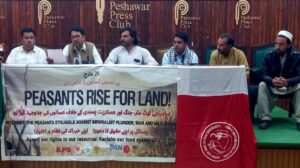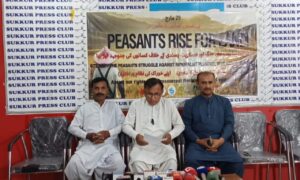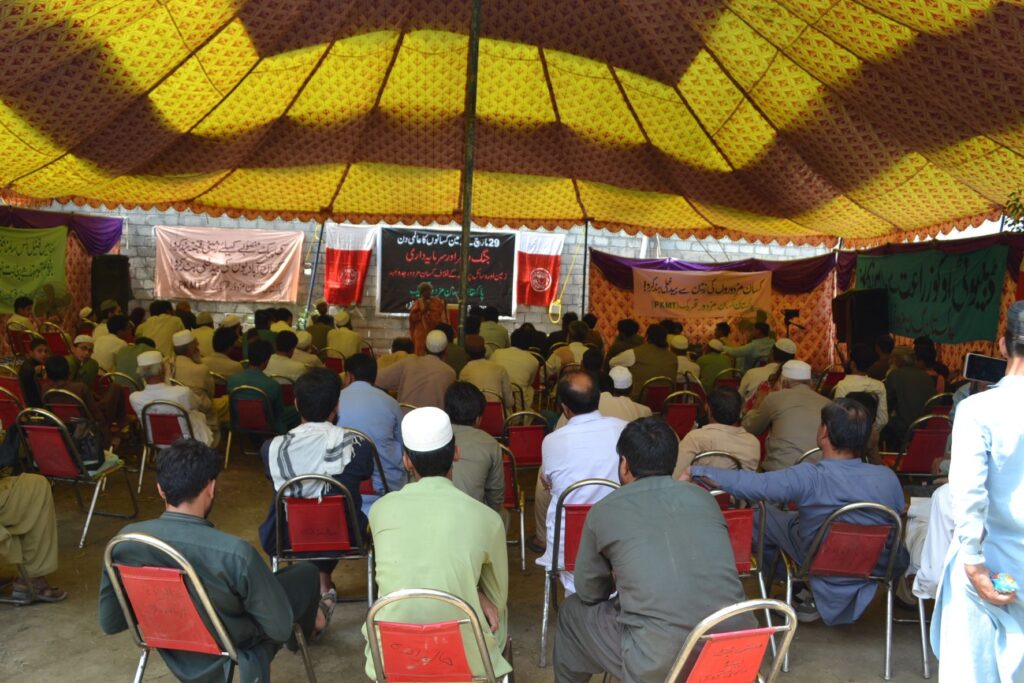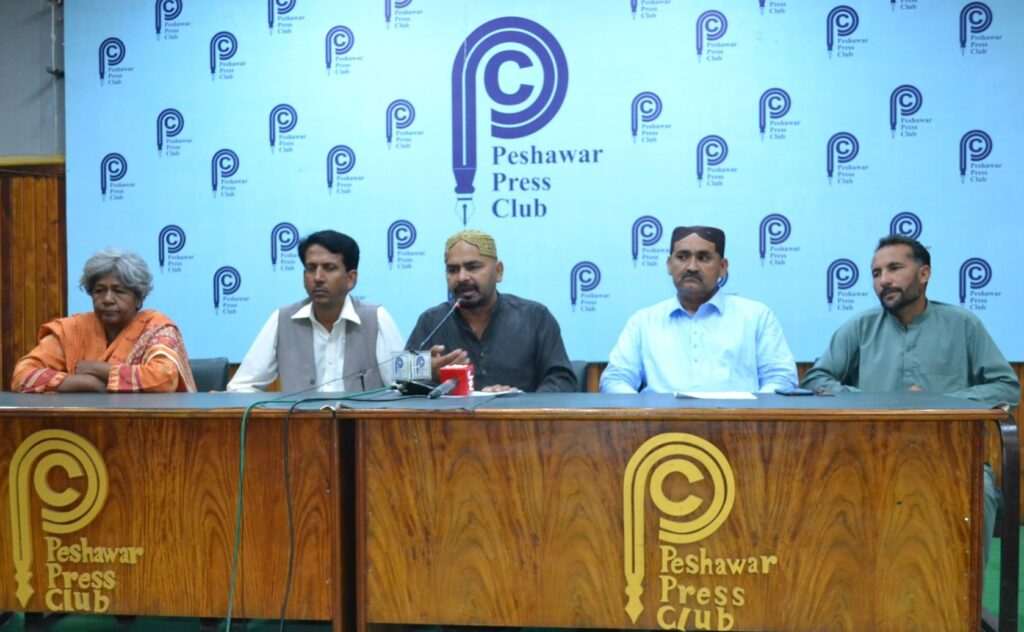پریس ریلیز | 29 مارچ بے زمین کسانوں کا عالمی دن
پچھلے کئی سالوں سے پاکستان کسان مزدور تحریک دیگر کسان مزدور اور سامراج مخالف تحریکوں،ایشین پیزینٹ کولیشن (اے پی سی) ، پیپلز کولیشن آن فوڈ سورنٹی (پی سی ایف ایس )، پیسٹی سائیڈایکشن نیٹ ورک ایشیا پیسیفک (پین اے پی )اور انٹرنیشنل لیگ آف پیپلز اسٹراگل (آئی ایل پی ایس)کے اشتراک سے 29 مارچ کو بے زمین کسانوں کے عالمی دن کے طور پر منارہی ہے۔ اس دن کو منانے کا مقصد خوراک کی خود مختاری اور دنیا بھر میں حقیقی زرعی اصلاحات کے لیے چھوٹے اور بے زمین کسانوں کی جدوجہد کو اُجاگر کرنے کے ساتھ ساتھ ملٹی نیشنل کمپنیوں اور ان کی نمائندگی کرنے والی سامراجی ممالک کے ساتھ ساتھ تیسری دنیا کے ممالک کی حکومتوں کے ظلم، جبر اور استحصال کو بے نقاب کرنا بھی شامل ہے۔
اس وقت دنیا خصوصاً پاکستان شدید معاشی بحران کے شکنجے میں ہے، کروڑوں لوگ خاص کر محنت کش طبقہ شدید غربت، بیروزگاری اور بھوک سے نڈھال ہے۔ ان حالات میں بھی سامراجی ممالک خاص کر امریکہ اپنے بنائے گئے سامراجی اداروں آئی ایم ایف، ورلڈ بینک اور ڈبلیو ٹی او کے ذریعہ حالات کو مزید پستی کی طرف لے کر جارہے ہیں اور اس کے ساتھ ساتھ جنگ، عسکریت پسندی کے ذریعہ ماحولیاتی تباہی، زمین، پانی، سمندر، جنگل، معدنیات اور دیگر قدرتی وسائل لوٹنے اور قبضہ کرنے کے درپے ہیں۔ امریکی ایما پر صیہونی اسرائیل کا فلسطینیوں کی نسل کشی اور فلسطینی سر زمین پر قبضہ اسکی ایک مثال ہے۔
ان ہی حالات کا شکار پاکستانی عوام خاص طور پر دیہی آبادیاں ہیں۔ مانسہرہ اور دیگر اضلاع میں مقامی آبادیوں کو جنگلات تک رسائی سے روکا جارہا ہے۔ پشاور میں ترقیاتی منصوبوں کے آڑ میں مقامی آبادیوں سے زمین چھینی جارہی ہے۔ گرین اینیشٹو کے نام پر پنجاب اور سندھ میں ہزاروں ایکڑ اراضی کو کارپوریٹ زراعت کے لیے مختص کردیا گیا ہے۔ وودھ اور مال مویشی شعبہ پر ملٹی نیشنل کمپنیوں کے قبضے کے لیے پہلے ہی راہ ہموار کردی گئی ہے جس کے تحت کھلا اور تازہ دودھ پر پابندی اور کمپنیوں کا ڈبہ بند دودھ کو فروغ دیا جارہا ہے۔ اُس کے ساتھ ساتھ جنیانی بیجوں کو فروغ دیا جارہا ہے جو کے خاص طور پر بیج کی دیوہکل کمپنیوں کے بے تحاشہ منافع کا ضامن ہے۔اسی طرح پیپسی کو جیسی دیوہیکل کارپوریشنز کو ہزاروں ایکڑ اراضی آلو پیدا کرنے کے لیے دی گئی ہے جس کے نتیجے میں چھوٹے اور بے زمین کسان مزدور بے زمینی، بے روزگاری اور بھوک کو فروغ دینے والی اجرت پر کام کرنے پر مجبور ہو گئے ہیں۔اس اراضی پر آلو کا بیج اس کمپنی کی ملکیت ہے۔
خوراک کے نظام کی ڈیجیٹلائزیشن جس کی مثال پاکستان کسان کارڈ ہے جو آزاد تجارت کا ایک خطرناک عنصر ہے نہ صرف زرعی کیمیائی کارپوریشنوں بلکہ مالیاتی اور آئی ٹی کارپوریشنوں کو زراعت پر قبضہ کرنے کی جگہ دے رہی ہے۔ اس کے علاوہ زراعت اور دیگر شعبوں میں جدت کی آڑ میں ڈرون ٹیکنالوجی کا استعمال بھی دیہی آبادیوں کے روزگار پر غلبہ کے حصول کے لیے راہ ہموار کر رہا ہے۔
ایگرو فیول کے حصول کے لیے گنے کی پیداوار میں اضافہ نے بے زمین کسانوں کو شدید بھوک اور غربت کی چکی میں دھکیل دیا ہے، گنے کی کاشت کی وجہ سے گندم جیسی اہم غذائی فصلیں بہت زیادہ متاثر ہورہی ہیں۔ منافع کے متلاشی کارپوریشنوں، سامراجی دلالوں کو ہمارا ریاستی نظام جو کہ زیادہ تر جاگیردار طبقے کے زیر قبضہ ہے پوری طرح سہولیات فراہم کررہا ہے۔
عوام پہلے ہی کسمپرسی میں زندگی گزارنے پر مجبور ہیں اور ہماری اشرافیہ دریائے سندھ سے چھ نئے کنال کی تعمیر کا اعلان کرچکی ہے۔ سندھ خصوصاً زیریں سندھ پہلے ہی غیر منصفانہ پانی کی تقسیم کا شکار ہے، نئے اعلان کردہ کنال کی تعمیر سے مزید ناانصافی کا شکار ہوگا، اس لیے اس منصوبے کے خلاف بڑے پیمانے پر احتجاج کیا جارہا ہے۔
بھوک اور بے زمینی کے شکار عوام کے لیے ایک اور بھیانک خبر یہ ہے کی وفاقی حکومت نے آئی ایم ایف کے شرائط کے تحت 2024-2025 کے لیے گندم کی کم سے کم امدادی قیمت کا خاتمہ کردیا ہے۔ گندم کی امدادی قیمت کے خاتمہ کی حکومتی پالیسی چھوٹے اور بے زمین کسانوں کے لیے تباہی لیے ہوئے ہے۔ زیادہ تر کسانوں کا کہنا ہے کہ حکومت پہلے جو امدادی قیمت طے کرتی تھی وہ بھی ہمارے اخراجات کے مقابلے میں انتہائی کم تھی مگر اب قیمت کا تعین آزاد منڈی کے حوالے کرنے سے تو ہماری کمر ٹوٹ جائے گی۔ کروڑوں کسانوں پر پڑنے والے اس انتہائی منفی اثرات سے نظر چرانہ حکومت کی ایک اور سفاک حکمت عملی ہے۔
صاف ظاہر ہے کہ ہماری حکومت کسانوں خاص طور پر بے زمین کسانوں، زرعی مزدوروں، ماہی گیروں، دیہی عورتوں، نوجوانوں اور بچوں کے مفادات کے تحفظ کے لیے پالیسیوں اور قوانین لاگو کرنے کے بجائے آزاد منڈی کے قوانین لاگو کررہی ہے۔ جو عوام کی بربادی کی شکل میں سامنے آرہا ہے۔
پی کے ایم ٹی چھوٹے اور بے زمین کسانوں، محنت کش طبقہ کے حقوق کے لیے اپنی لڑائی میں مضبوطی سے کھڑی ہے۔ ہم خوراک کی خود مختاری کے لیے جدوجہد جاری رکھیں گے جس میں زمینوں کی منصفانہ اور مساویانہ تقسیم کے ساتھ ساتھ اپنا بیج اگائیں گے کمپنیوں کو بھگائیں گے کے مقاصد کو سامنے رکھتے ہوئے محنت کش طبقہ کے ساتھ اپنی یکجہتی کو مضبوط کریں گے۔ زمین، جنگل، پہاڑ، سمندر سمیت دیگر وسائل پرمقامی آبادی کے اختیار اور فیصلہ سازی کے حصول والے نظام کو فروغ دیتے ہوئے جاگیر دارانہ، سرمایہ دارانہ اور کارپوریٹ قبضے کو بے نقاب کریں گے۔
(PKMT) جاری کردہ :پاکستان کسان مزدور تحریک
Press Release DOTL 2025 – English | Press Release DOTL 2025 – Sindhi




